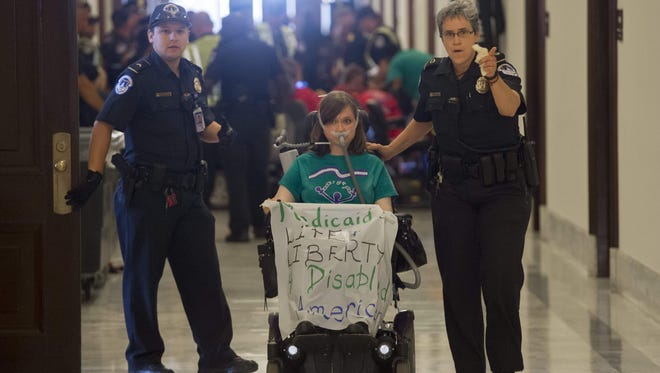Senate health care bill: Here's how it would affect you

WASHINGTON — Senate Republicans’ proposal to rewrite the Affordable Care Act would scale back federal funding for Medicaid, change the subsidies available to help low- and moderate-income people buy private insurance, end the mandate that most people buy insurance and repeal taxes that helped expand coverage to about 20 million Americans.
Here’s a look at how the bill released Thursday could affect you.
Would you still receive a subsidy to reduce the cost of premiums?
You could lose all or some of your subsidy, which is now available to people earning up to $84,650 for a family of three. That income limit would be lowered slightly and would become less generous. The changes amount to about a 15% cut for those who would qualify, according to Larry Levitt, senior vice president at the nonpartisan Kaiser Family Foundation.
Most of the 10.3 million Americans who had purchased a plan through the ACA exchanges as of February were receiving subsidies.
Would you still get help paying for deductibles and co-payments?
The bill would sunset in two years subsidies for people who purchase insurance on an exchange. Most of the more than 6 million Americans benefiting from the help may not be aware they’re getting it, since the subsidy goes directly to the insurer who then lowers the cost-sharing requirements for a plan. Without the subsidies, insurers would need to raise rates an estimated 20% to make up for the loss, experts have estimated. But the bill also includes funding for states to reduce insurance costs in other ways.
Could older people be charged more?
The bill would eliminate the ACA's requirement that insurers can't charge older customers more than three times what younger customers pay for the same coverage. Instead, those in their 60s could be charged five times as much, or more.
What happens to people on Medicaid?
If you are among the more than 14 million Americans who gained eligibility through the Affordable Care Act, you could lose it, but not for a few years. Enhanced federal funding for the low-income adults who became newly qualified under the ACA would be phased out, ending after 2024.
Federal support for traditional Medicaid would also be scaled back. States, which pay a portion of the cost of Medicaid, would have to find new funding or cut the program through restricting enrollment, curbing benefits, reducing payments to health care providers or finding efficiencies. But there is little evidence that large savings can be achieved through efficiencies, according to the Kaiser Family Foundation.
Are you still required to buy health insurance?
The bill effectively removes the ACA’s requirement that most people buy insurance by eliminating the tax penalties for failing to do so. For 2015, 6.5 million taxpayers owed the IRS a penalty for not having insurance.
The Trump administration already directed the IRS to ease enforcement of the mandate.
While unpopular, the coverage mandate was included in the ACA to encourage healthy people to buy insurance, which spreads the risk to insurers and reduces the cost of plans. Actuaries expect premiums to rise without the mandate.
Do you receive health care through an employer?
The bill would end the ACA’s penalties for larger employers who don't offer insurance to workers. The nonpartisan Congressional Budget Office has said fewer employers will offer coverage if that change is made.
Are you or a family member struggling with addiction?
The bill includes $2 billion for grants to states for addiction services, a response to concerns that cutting spending for Medicaid would curtail access to treatment programs. Critics say that’s not nearly enough.
What happens to coverage for abortion services?
Insurance plans sold through the exchanges could not cover abortion services. There’s an exception for abortions performed to save the life of the mother, or to end a pregnancy that resulted from rape or incest.
What about services offered by Planned Parenthood?
The bill would block Planned Parenthood from receiving Medicaid funding for a year. The federal government already prevents Medicaid patients from receiving abortion services. But the bill would also block them from using Planned Parenthood for contraception, testing for and treatment of sexually transmitted diseases, and other services.
Will you get a tax cut?
The bill would repeal various taxes imposed by the ACA, including those on tanning beds, high-cost health plans, sectors of the health care industry, and higher earners with a lot of income from capital gains.
What happens to coverage for maternity care, drug benefits and pediatric dental care?
The bill would make it easier for states to waive requirements that insurance plans cover specific benefits. Before the ACA, many plans did not cover mental health or maternity care, and some did not cover pharmaceuticals. Some other services were available only at an extra cost. While the ACA already allows states to seek permission from the federal government to waive insurance rules, the Senate bill would remove the requirement that any changes not result in a drop in coverage or more expensive plans. The bill would also end the ACA's requirement that insurers spend a specific amount of the premiums they collect on benefits, instead of on profits, administration and other expenses.
Read more:
Senate health care bill analysis: Despite risk, Republicans don't have a choice
Senate Republicans unveil health care bill that slashes taxes, rolls back Medicaid
Senate Democrats launch tactics to slow work on health care bill
Trump: Senate health care bill may need some changes
Protesters gather in front of Mitch McConnell's office for 'die-in'
By keeping money for insurance subsidies, GOP health bill may lower premiums